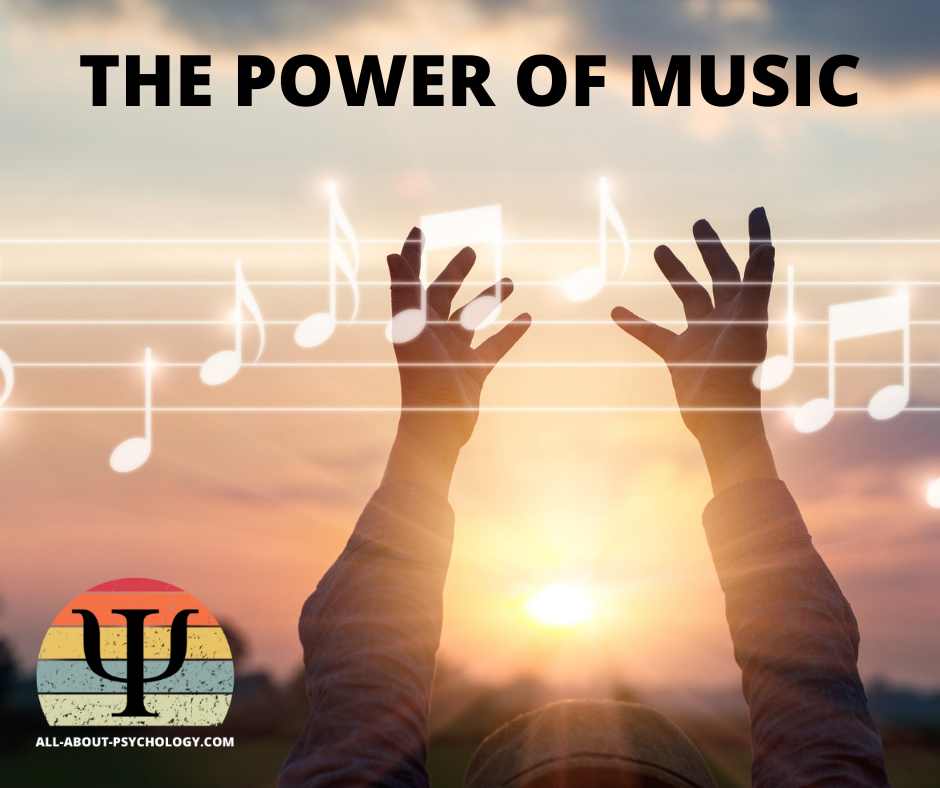Psychology Classics On Amazon

The Power of Music
This classic article in the history of the psychology of music by Halbert Hains Britan was originally published in the Journal of Philosophy, Psychology and Scientific Methods in 1908.
The Article in Full
If one were asked to differentiate between music and the other arts, he would naturally turn first to the medium in which it is expressed. But there are distinguishing characteristics of quantity as well as of quality. While the other arts may show them to some extent, with music they are attributes of preeminent importance. We refer to the universality of the appeal music makes to man, to its versatility, and to its power. By the first we mean that music can claim for itself a larger and a more appreciative audience than any other art. Under the widest possible differences of race, natural intelligence, and education, music is effective in its appeal to the human mind either to stimulate it to crude and passionate reactions or, at the other extreme, to awaken the purest and strongest esthetic emotions. True, the character of the music appreciated varies with the different degrees of education and civilization to which the individual or the race has attained, but only seldom, if ever, do we find a person not susceptible to some element of music, to simple melody or to rhythm.
By versatility we mean the unique power music possesses to stimulate emotions of the most striking differences of mental coloring and bodily reactions. It can arouse enthusiasm, stifle bodily fatigue, instil courage and endurance, animate the mind with gayety, or calm it to religious worship and prayerful meditation. Whatever the emotion, whether of joy or of grief, of excitement or repose, of comedy or of tragedy, music has a note to deepen the feeling of sadness or to heighten the touch of joy. No other art can appeal to such an extended range of human emotions and touch them all with such a magical hand.
The third attribute of this, the strangest and most subtle of the arts, is its power. Not only does music appeal to the human mind widely, but it appeals everywhere strongly. No other art, with the possible exception of literature, can make the emotions so poignantly real or so effectively oppose the dominance of some controlling mood. Upon this attribute of music the world has remarked, and, perchance, reflected, since the days when David took his harp to solace the heart of Saul, and the Greeks repeated the mythical story of Orpheus, how by his music he charmed the hearts of man and beast.
Yet while these attributes of the musical art have not escaped the notice of the world, but have been abundantly recognized and remarked upon by men of poetic, and of scientific, and of philosophic vision, but little-astonishingly little-has been done to explain them. Musical esthetics is, at the present time, not only the most obscure, but also the least developed subject in all the philosophy of art. To give an adequate explanation to the facts to which we have referred requires a more thorough psychological analysis of music and a more philosophical examination of the facts thus gained than has yet been made. However, pending this scholarly desideratum, we may remark upon these points with perhaps something gained toward an ultimate explanation. Let us state a little more definitely just what we mean by the power of music.
When we speak of the power of music, we mean that it has a way of forcing itself upon our attention as no other art has. It impresses itself upon our minds, so that we must give it audience and listen to its message. There are two ways in which this unique power of music manifests itself. In the first place, music is sensuously more impressive, more insistent, than any other art. Again, no other art, with the possible exception of literature as exemplified in the drama and the novel, takes hold so firmly of our emotional nature or stirs so deeply the nether strata of this side of consciousness. Can definite and plausible reasons for these facts be given?
There are three points we wish to present as throwing light upon the attribute upon which we have last commented. They are these: (1) The biological significance of sound, the medium through which music is expressed, (2) the organic character of rhythm, and (3) the dynamic character of the various elements of musical symbolism. Let us amplify these points in order.
As an art music gains greatly in impressiveness and in power by reason of the fact that it has for its medium of expression that sense stimulus which both psychologists and biologists are telling us is most intimately connected with the emotional life. An Italian psychologist only recently, seeking for an explanation of the close relationship between music and the emotions, has advanced the theory that the fibers of the auditory nerve are interlaced with the fibers of the pneumogastric nerve, connecting the emotions in this way with sound stimuli through the functioning of the vital organs.
Whether or not the theory be true, the fact which the hypothesis was meant to explain can not well be denied. Of this experience well assures us.
Biologists, too, impressed with this fact, from the time of Darwin and Spencer have not ceased to remind us, some in one way, some in another, that sound is the most natural and most effective way of expressing and communicating the emotions, and is, therefore, the most exciting form of sense stimulus. Spencer's theory of music, it will be remembered, is that music is but a development from the emotional outcries of our primitive ancestors. Here, again, we will leave the theorist to his theories, to work them out as best he can; it will suffice in this connection if we recognize the fact their theories are meant to explain, viz., that sound as sound is the most effective stimulus emotionally carried to the brain from any of its organs of perception. Common experience can here be appealed to also: the moans of a sufferer excite our sympathy and pity as his emaciated form will not; animals habitually silent in extremities of suffering or of distress give utterance to cries of the most intense expressiveness; animals as well as men habitually communicate various emotional states through tonal inflection or intonation. As a consequence, sound qualities have become indissolubly associated with emotional states, and have come to be the most exciting, that is, the most impressive, stimulus of sense. This natural impressiveness of sound, instilled and fixed in us by ages of development in which considerations of life and death were involved, is carried over from the realm of crude emotional outcries to the realm of music, and there functions with undiminished vitality. Here it manifests itself by giving to the mere sound qualities of music, harmonic factors such as harmony and discord and dissonance, the major and minor modes, timbre, and modifications of tempo and force, an influence over the mind almost hypnotic in its directness and power.
In mentioning the organic character of rhythm as one of the causes for the peculiar power which music exerts over the human mind, we do so to call attention to the fact that rhythm is primarily of the body, not of the mind. So far as we can now see, it is due to the metabolism, purely physiological changes, of the nerve cells. The accumulation of energy here is approximately uniform, while the nervous discharge is essentially explosive, a certain potential being required before the nerve impulse can overcome the internal resistance of the nerve tracts. Under such conditions the nervous discharge must necessarily be periodic or rhythmical.
If we accept this theory of rhythm, it follows that rhythm or susceptibility to rhythmic stimulation has become ingrained in the very heart of that most vital of all vital substances, the nervous system, and functions there with all the compelling force of an instinct. This means much when translated into terms of impellent force or inherent power, for in proportion as an act is instinctive, that is, without consciousness of the end to be attained, the driving impulse, the vis a tergo, must be the stronger. By means of education and discipline man may place rational motives, high conscious purposes, over natural instincts, but in themselves and without years of training instincts would determine the activities of man as well as of animals. The impulse to play in the child is normally stronger than the impulse to do his tasks; the desire for wealth, the acquisitive instinct, even in spite of training is sometimes stronger than the cultivated habit of social regard. Education is easy just so far as we can take advantage of instincts to help us toward the desired end, and difficult just so far as we must oppose instincts which, having served their purpose, tend either to function still from their native strength or, having become half crystallized, to function as habits. Rhythm being organic, that is, inherent in the functional activity of the nervous system, possesses the force and clamant strength of instinctive activities. It may be blind, unreflective, and instinctive, but it is clamant, and intense, and strong.
As an element in music giving strength to the mental reaction music produces, it may be seen both in the crude, but intense, response of the primitive man to his rhythmic music and in the keen appreciation of the devotee to our best compositions. In the first case we see it in the war-dance, where the dancers are wrought up to an emotional intoxication or frenzy by the strongly accented and rapid rhythm of the drum or other instrument of percussion; at the other extreme it is exemplified in the characteristic response, refined and subdued, but nevertheless direct and full of power, given to modifications of rhythm and tempo in the different movements of our higher musical forms. Between these extremes it functions in various ways, but always, though it may be utilized as an intellectual factor, with a rich and instinctive emotional concomitant.
Our third point is psychological, and in order that its real significance may be appreciated it must be interpreted from that point of view. As it was stated, it affirmed that music gains in power because its elements and the symbolism it uses are inherently dynamic in character. Wagner evidently had adumbrations of this truth when, following the lead of Schopenhauer's philosophy, he affirmed that music was a direct expression of the universal will. Aristotle, also, much earlier must have partially realized the same truth when he asserted that music imitates most closely the inner life of the emotions. The truth, therefore, is of ancient lineage, though for all of that it has never yet been very clearly formulated. Let us see just what it means and what it implies.
If we pause for a moment to enumerate what we have called the sense or impressive qualities of music, we shall see very readily how strong in them is the dynamic factor. Rhythm and tempo and modifications of force are surcharged with movement and energy, while even the more static elements timbre and harmony are so intimately bound up with the melodic or harmonic progression (note the word) that they, too, are deeply fraught with the same quality. We shall appreciate this fact better, perhaps, if we contrast with it the symbolism in which other art ideas are expressed.
The purpose of the artist, for example, is to choose some critical moment in the experience of his characters and to crystallize this moment for us in such a way that the sense qualities are pleasing and the thought content is significant. But in all the various forms of this art, in landscape, in portraiture, in genre painting, there is the total absence of this dynamic quality in the sense stimulus. In this sense painting is all "still life." It is true that in painting we find figures representing motion and expressive of the utmost activity and effort, but even in these there is wanting that real movement and action in the sense stimulus which we have seen is characteristic of all music. In Millet's "Sower," for example, the figure is replete with energy and action, but the effect of such a representation is, in intensity, distinctly below the effect of strong rhythm or modifications of force or tempo. When the artist has done all in his power, the feeling of energy and movement is still inferential, not a direct datum of sense. In this art there are only quiescent figures, unchanging color forms. Considered as sensible forms, the representations of this art are static; and the emotions are aroused, not by the close analogy between the character of the sense factors and the natural life of the emotions, but chiefly through an appreciation of the thought content. A painting from its very nature tends to keep the emotion aroused upon one unchanging plane rather than to develop it up to a climax; once I comprehend the artist's thought an appreciate his technique, there is nothing in the stimulus itself to carry on the emotional consciousness to a richer, fuller life. On the other hand, the emotions which have been aroused tend at once, by a well-recognized psychological law, to fade away because of the necessary monotony of the stimulus. It is true that through association the representation may be so enriched that the emotions will be carried on to a full and a very rich reaction. The point we wish to emphasize is not that such works of art do not stimulate the emotions, but that they do not do it so directly as music; in the first case it is done principally through the thought expressed rather than by any dynamic suggestion in the sense stimulus employed.
Literature, on the other hand, well confirms our point as a positive example of the principles which give music its power. As Lessing long ago pointed out, literature is peculiarly adapted to express ideas in which there is development at successive mental states. Literature, therefore, ranks with music as an art adapted to carry the mind up to emotional climaxes, as, for example, in the drama or the novel. By means of conceptual representations presented in panoramic succession, that is, by the concrete imagery of language pictures or by certain types of thought, the emotions are awakened and stimulated and carried on to maximum degrees of intensity familiarly known as climaxes. It, like music, takes a deep hold upon the mind, therefore, because it conforms to the natural functioning of the emotional consciousness. But even as compared with literature the musical art in this respect stands superior. This dynamic similarity to the play of feeling, in music, extends down beyond the thought content even to the elements of its sensuous expression. In these sensuous elements themselves such as we have mentioned, as well as in the ideal content of music, we have an analogy, a dynamic similarity, to the emotions which, being sensuous, goes far to explain the clamant character and hypnotic power of this art.
This Music Lover T-Shirt is available from Amazon (prime eligible) in a range of colors for women and men. Sales help support this website, which has been providing free and comprehensive information and resources for psychology students and educators since 2008.
Recent Articles
-
Billy Milligan Case Study: Psychology, Crime, and the Split Mind
Apr 18, 25 09:10 AM
Was Billy Milligan a fractured victim—or a manipulative genius? This Billy Milligan case study explores the psychology behind one of history’s most controversial trials. -
Borderline Personality Disorder: More Than Mood Swings
Apr 18, 25 07:11 AM
Discover key facts about Borderline Personality Disorder, its symptoms, causes, treatment options, and why raising awareness is vital. -
Psychology Book Marketing
Apr 17, 25 04:56 AM
Psychology book marketing. Ignite your book's visibility by leveraging the massive reach of the All About Psychology website and social media channels.
Please help support this website by visiting the All About Psychology Amazon Store to check out an awesome collection of psychology books, gifts and T-shirts.
Go To The Psychology of Music Page






